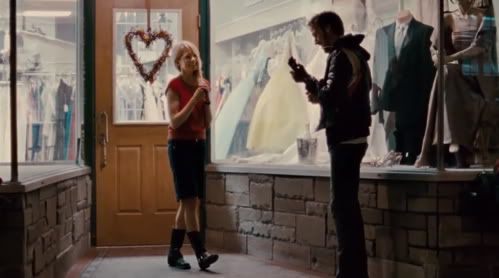It's the tattooed broken promise that I hide beneath my sleeve

This simple way to describe Derek Cianfrance's Blue Valentine is that its about both ends of a relationship: the beginning that's full of promise and inspiration, and the ending that is like a crushing blow delivered over and over again. That's what the film is on the surface of it, but the brilliance of the work is that it's not that simple.
Blue Valentine focuses on the relationship of Dean and Cindy, played by Ryan Gosling and Michelle Williams, respectively. The film explores both the genesis of their marriage and its closing moments, as strains ruptures into wounds that presumably can never be adequately mended. The narrative flow shifts back and forth in time between the two portions of the relationship, pulling the good and the bad together as tightly as dovetail joints. But it's not just good and bad. Cianfrance avoids the most obvious path, developing tonal and emotional tension out of contrasting the bliss of courtship with the agony of separating. There's definitely more sweetness to be found in the scenes set an an earlier point in their time together, but Cianfrance is committed enough to realism that he builds in more complexity. There are challenges from the very beginning, details that hint at the precarious nature of their coupling. There is hardship that must be overcome that they count on one another to pull each other through. Sadly, believably, the possibility that these pains will be their eventual undoing is equally clear.
The intimacy of Cianfrance's script, written with Cami Delavigne and Joey Curtis, is reliant on probing performances by the actors in the two lead roles. Gosling and Williams carry that burden in magnificent fashion. Ryan Gosling locks into Dean's brand of childishness that merges open-hearted innocence with a troubled impetuousness. He chose to grow up without actually have the tools to accomplish it. He sees the world in same simple, unassuming terms that led him to make his noble commitments to Cindy in the first place. In the five-year span between the two portions of the film, his character changes only subtly. In some respects, his maturity level actually erodes somewhat as he struggles with being a responsible adult. Cindy, on the other hand, is at completely different emotional states at the different points presented, and Michelle Williams conveys that transformation with astonishing skill. Gosling has a couple of key visual characteristics--a receding hairline, different facial hair--to signify the different points in time where his character resides, but Williams does it entirely with her demeanor, her energy and, most amazing, the look in her eyes. She looks at the world differently because all she sees when she surveys her marriage is damage, and the pain of that registers in her face. Since Cindy spends much of the film dealing with her pain through the avoidance of silence, Williams is charged with making her inner life evident by using other tools, which doesn't compromise the fullness of the portrayal in the slightest.
It's to Cianfrance's credit that every transition between timeframes is painful. It's not simply the leaping from the beginning to the end that causes distress; the journey the other direction is equally hard, the comparative charm and comfort of the early days shaded by the shattering moments to come. The authenticity of the work keeps it from becoming manipulative. Blue Valentine doesn't cheat. It doesn't push, it doesn't strain. It is honest, plain and heartbreaking through being steadfastly true to its characters and their situation. If it's not always easy to watch, it is consistently rewarding in the way of great, uncompromising art.